"Sentinels of the Sound" beach cleanup June 14th
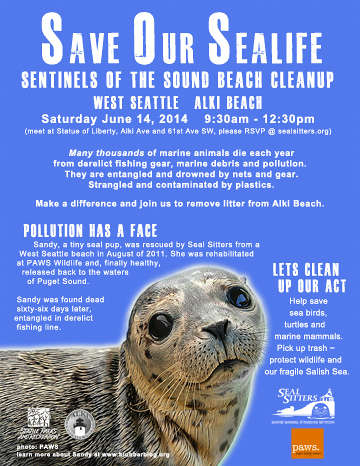
Please RSVP.
Prior to dispersing volunteers with materials to pick up trash, Seal Sitters and PAWS Wildlife Center will speak briefly at 9:30 about the dangers of marine debris to wildlife and the difficult rehab of harbor seal pups.
All marine life is endangered by marine debris and pollution. Many, many thousands of marine animals and sea birds die each year from derelict fishing gear, marine debris and pollution. They are entangled and drowned by nets and gear. Strangled and contaminated by plastics. Sea birds choke on plastic and limbs are severed.
This year's beach cleanup events will once again be in honor of seal pup Sandy who was rescued from a West Seattle beach in August of 2011, rehabilitated at PAWS Wildlife Center, and then released back to the wild in January of 2012. Sandy was found dead 66 days later, entangled in derelict fishing gear. The event is also in honor of the juvenile gray whale that died on Arroyos beach in April of 2010. The necropsy revealed only human trash in the whale’s stomach.
Please join us to help save marine life! For more info and to RSVP, please click here.
Lend a hand for beach cleanup and save marine life
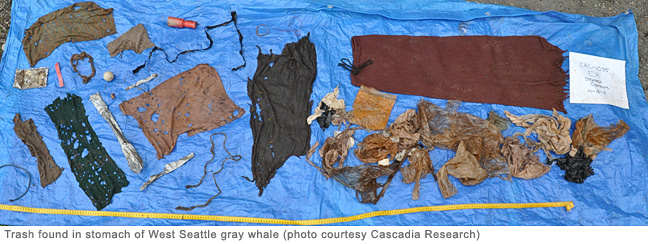
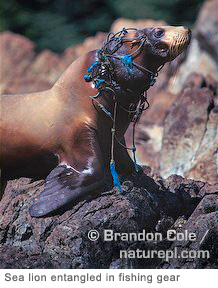
NOAA has produced several children’s activity booklets about marine debris that are available here for download: Protect the Ocean and Understanding Marine Debris. Both contain puzzles and illustrations that help kids understand the importance of keeping the beaches and marine waters free of trash - so that sea life will be here for many generations to come!
Thanks to the Americorps (Washington Reading Corps of South King County) volunteers who will be participating in the beach cleanup as well as members of ACC and Seal Sitters. This event is open to the public and all those interested in making a difference for the environment. If you, your group, or class would like to lend a hand, meet us at the Statue of Liberty across from Starbucks (Alki Ave SW near 61st) at 9am. If you have questions, please contact Larry Carpenter @ 206-938-0887. Special thanks to Carol Baker and Colleen Hackett of Seattle Parks for providing cleanup tools. Tully’s, Starbucks and Pioneer Coffee are all generously donating coffee to keep our volunteers warm and energized throughout the morning. We hope to see you there!
Early morning wake-up call
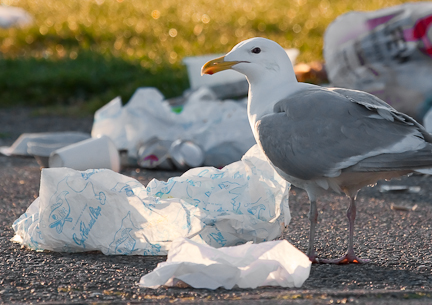
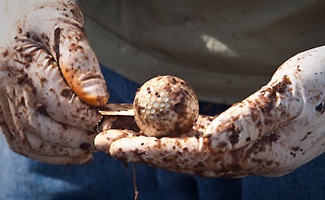
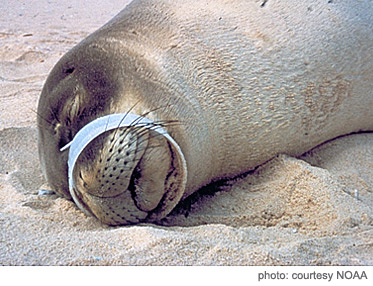
Gray whale necropsy reveals trash inside stomach
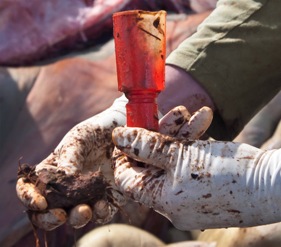
The public should give many thanks to the necropsy team for performing this incredibly important and physically strenuous work. Due to their dedication and efforts, we are now aware of the role that pollution may have played in the death of this whale - as it indeed impacts all our marine life. Plastics that end up in our waters never go away - they eventually end up as micro particles which absorb contaminants and enter the marine food chain, causing deformities and disease. It is well known that our local seals and orcas are laced with pcbs and other toxic chemicals. Depletion of food sources caused by commercial overfishing and pollution can be reversed by getting involved. You CAN make a difference - pick up trash on the beach, don’t purchase seafood on the seafood watch list and ask your grocer not to sell it, help clean up the Sound.
As an observer, our volunteer was stunned at the amount of trash that was removed from the whale - and overwhelmed with sadness that human impact had, in any way, contributed to this whale’s demise. Please learn more about our polluted waters and the Great Pacific Garbage Patch, an oceanic swirling mass of plastic twice the size of Texas, on Seal Sitters’ website. Educate people about the dangers of pollution and its tragic impact on our wildlife now and for generations to come. Make a commitment that this magnificent whale’s life was not given in vain.
See news video here.
Read Lynda Mape’s excellent article in the Seattle Times.
Gray whale strands in West Seattle
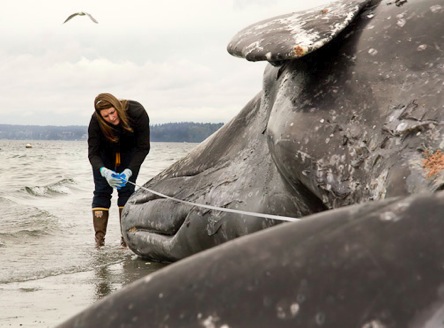
The whale is being towed to an undisclosed location where a necropsy (tentatively scheduled for Sunday) will be led by Cascadia Research and WDFW biologists. The body will be left to decompose over time and nourish the ecosystem. A local college will then recover the skeletal remains for educational purposes. View a photo gallery.
UPDATE: 4/20 NECROPSY RESULTS REVEALED
For the disturbing necropsy results on this gray whale, please click here.
Links of interest:
Seal Sitter founder and renowned nature writer Brenda Peterson co-authored (with native American Linda Hogan) the book, Sightings: The Gray Whale’s Mysterious Journey.
Seal Sitter scientific advisor, Dr. Toni Frohoff, is featured in a New York Times Magazine article about the gray whale birthing lagoons in Baja, Mexico.
SAD UPDATE: According to Cascadia Research, the gray whale seen feeding in West Seattle waters (not the whale discussed in the above post) on March 27th has been photographically matched to a 40 foot adult whale that died on April 11th near Fidalgo Island. Read the report here.
Related news:
Gray whales wash up in area waters (Vancouver Sun)







